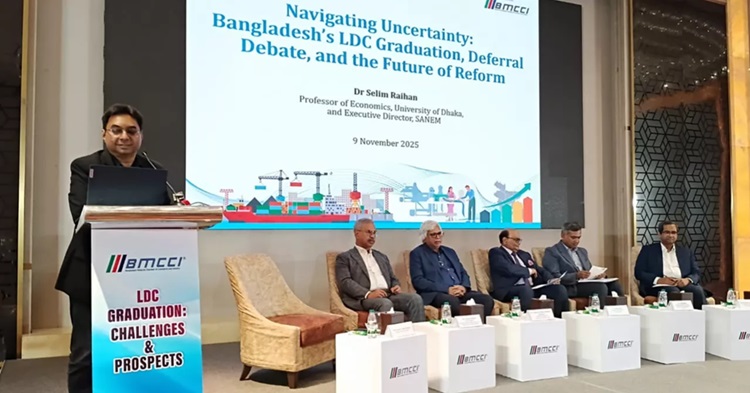Bangladesh’s LDC graduation debate intensifies amid ‘economic risks’


Bangladesh’s scheduled graduation from Least Developed Country (LDC) status in 2026 faces growing uncertainty, with experts warning that deep structural weaknesses and an inadequate transition strategy pose serious risks to the economy.
The remarks were made at a seminar on ‘LDC Graduation: Challenges & Prospects’ held on Sunday at a city hotel, organised by the Bangladesh-Malaysia Chamber of Commerce and Industry (BMCCI).
Senior policymakers, economists, and industry leaders to discuss strategic imperatives for the post-LDC transition, including trade competitiveness, institutional readiness, and inclusive development joined the seminar.
Commerce Secretary Mahbubur Rahman attended it as the guest of honour, while Professor Dr Selim Raihan, Executive Director of SANEM, delivered the keynote presentation. Economist Dr Zaidi Sattar, Chairman of the Policy Research Institute (PRI), chaired the seminar.
Other speakers included Dr Khondaker Golam Moazzem, Research Director at the Centre for Policy Dialogue (CPD); Dr A Razzaque, Chairman of Research and Policy Integration for Development (RAPID); Anwar-Ul-Alam Chowdhury (Parvez), President of the Bangladesh Chamber of Industries (BCI); and Faruque Hassan, former President of the Bangladesh Garment Manufacturers and Exporters Association (BGMEA).
Commerce Secretary Mahbubur Rahman said, “We request the United Nations General Assembly (UNGA) to visit Bangladesh to assess the latest situation ahead of the potential graduation. In addition to the EU and the USA, the government is in talks with Canada, Australia, Japan, South Korea, and other countries to boost bilateral trade and diversify export destinations.”
Dr Raihan highlighted that Bangladesh’s readiness for LDC graduation is under scrutiny amid global economic volatility and concerns over losing LDC-specific international support measures.
“The core risk lies in the trade sector, given Bangladesh’s heavy reliance on Ready-Made Garment (RMG) exports and duty-free, quota-free (DFQF) market access. The erosion of these trade privileges could cost the country billions in lost earnings and place additional pressure on foreign reserves,” he said.
He pointed to persistent domestic structural challenges, including macroeconomic stress from low foreign reserves, fiscal gaps, high inflation, and global volatility; structural flaws such as weak tax collection, a fragile banking sector, high export concentration, and limited foreign direct investment (FDI); and reform deficits driven by entrenched ‘rent-seeking networks’ among political, business, and bureaucratic elites that continue to obstruct meaningful policy change
Dr Raihan also critiqued the government’s Smooth Transition Strategy (STS), describing it as ‘overly broad’ with an ‘overextended vision’ that risks becoming an unenforced policy document.
While the private sector advocates for a three-year deferral to gain ‘critical breathing space’ for compliance and to fast-track stalled reforms, securing a delay would be diplomatically challenging.
The UN Committee for Development Policy (CDP) requires evidence of ‘unforeseen and unmanageable’ shocks—not merely delayed reforms or poor preparedness—to grant a deferral. Experts also caution that seeking a delay could signal economic weakness, undermine investor confidence, and entrench complacency rather than promote essential reforms.
Dr Raihan concluded, “The real question is not timing but political will. Any deferral request must be transparent, evidence-based, and paired with a credible, time-bound reform agenda to ensure post-LDC resilience, rather than serving as a retreat.”
